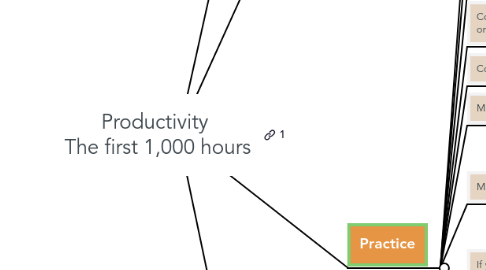
1. Expectations
1.1. Master your "why" and all the steps required to reach it
1.2. Master most of the techniques that relate to priority management
1.3. Become very good at the mental models that relate to time management
1.4. Not waste time with anything that relates to meetings
1.5. Audit and block time like a pro
1.6. Figure out how to "cut" waiting time
1.7. Mostly master resting
1.8. Workout and walk effectively
1.9. Become very good at nutrition and, optionally, fasting
1.10. Create and maintain habits
1.11. Improve your mind
1.12. Master "when"
2. Prepare
2.1. Learn how to improve your mind, but practicing positivity and meditation
2.2. Check out the resources we've included in this skill tree about the mind.
2.3. Understand the 5-hour rule and 1-50 rule included in this skill tree
2.4. Review the different things you've previously learned
2.4.1. For each new concept you learn, review it after a day, a week, and a month.
3. Practice
3.1. Practice of all the techniques you've previously learned.
3.2. Continue journaling.
3.3. Continue updating your Map of Life monthly.
3.4. Continue figuring out your Ikigai quarterly or yearly.
3.5. Continue building your good habits.
3.6. Make this all feel automatic.
3.7. Master sleeping and power napping.
3.7.1. Keep reading about it and experimenting with your schedule until you find the right one.
3.7.2. Power napping should be something you strive to do daily for 15-25 minutes.
3.8. If you're dealing with projects that may take a lot of time to do, carefully look at the 1-50 rule.
3.8.1. Implement it for up to 10 projects, leading for up to 100 hours.
3.9. Carefully think about how you use your waiting time.
3.9.1. It's okay to have time when you're doing nothing, but there are times when you're also waiting needlessly. Make the difference between the two.
3.9.2. When waiting needlessly, find a micro activity you can do to occupy that time.
3.9.2.1. Eg: meditate, write down things you're grateful for, read an article, read pages of a book, listen to a few minutes of a podcast, and many more.
3.10. Improve your mind.
3.10.1. If you're still having negative self-talk, spend more time on positivity to try to surpress it.
3.10.2. Practice daily meditation.
3.10.2.1. It doesn't have to be long at all.
3.10.2.2. The more you're used to it, the shorter your sessions can be.
3.10.2.3. Experiment and find your sweet spot.
4. Ponder
4.1. Ponder on the usual questions:
4.1.1. What went right?
4.1.2. What went wrong?
4.1.3. How can I improve?
4.2. Near the end of your 1,000 hours, reflect on the following questions:
4.2.1. Do I feel more productive than I was when I started learning about productivity? How so?
4.2.2. Am I really more productive or is it just a feeling? What makes me think I'm more productive?
4.2.3. If you are more productive, what has your "added" time and energy allowed you to do?
4.2.4. What activities have helped the most? How so?
4.2.5. What activities will I keep doing forward? Why?
4.2.6. What activities will I not pursue? Why not?
4.2.7. Do I have more to learn? What is it?
4.2.8. Is there anything you wish you would have done differently? What is it?
